National public health leaders visit





IN an event organised by Professor Richard Parish CBE, some of the UK’s leading figures in public health visited the University to meet students and discuss health initiatives in the region.
Professor Dame Jenny Harries, Chief Executive of the UK Health Security Agency (UKHSA) and a Visiting Professor at the University of Chester, was joined by: Lord Kamlish Patel, Chair of Social Work England; Professor Andrew Dickenson, Chief Dental Officer for Wales; Professor Ian Ashworth, Director of Public Health, Cheshire West and Chester Council; Professor Helen Bromley, Consultant in Public Health, Cheshire West and Chester Council and Simon Whitehouse, Chief Executive Officer for Shropshire, Telford and Wrekin Integrated Care System.
Professor Dame Harries met with students studying to become the health professionals of tomorrow
at the University’s state-of-the-art Simulation Suite in its Wheeler Building. The Suite has been designed to provide connected clinical spaces to represent the journey a patient or service user would take when navigating the health and social care system. This includes patient simulators which are vital in enabling students to learn how to respond in a clinical situation in a safe way before they use their skills in practice.

Jenny also met the team from the Cheshire and Wirral Partnership NHS Foundation Trust’s Living Well mobile service which was at the University’s Exton Park site offering students and staff a range of drop-in services including health checks and advice; sexual health, mental health and stop smoking advice and to support COVID-19 vaccination boosters.
Senior representatives from the University including Vice-Chancellor
FROM public lectures to art exhibitions, through to business focused events, there’s always something to get involved in at the University. Below is just a taster of things we’ve got coming up in the next few months.
OLYMPIC legacy policy; active travel and the lives of male professional golfers and footballers will be discussed in a public lecture at the University.
Professor Daniel Bloyce, Deputy Head of the Department of Sport and Exercise Sciences will deliver his inaugural lecture on Wednesday, November 30 at 6.30pm in room 017 in the Anna Sutton building at the Exton Park
The lecture titled From research to policy in the sociology of sport: the reality of knowledge transfer will see Daniel presenting both his and his PhD students’ experiences
Professor Eunice Simmons; Executive Dean of the Faculty of Health and Social Care, Professor Angela Simpson and Professor Paul Kingston, Director of the Centre for Ageing and Mental Health joined Jenny during the visit.
Professor Simmons said: “We were very pleased indeed to welcome Professor Dame Jenny Harries and her esteemed colleagues to the University to meet some of our students and to see our facilities first-hand.
“Professor Dame Harries has also become one of our Visiting Professors and we are thrilled she will be able to share her extensive knowledge of public health matters with our students.”
of trying to use research in the sociology of sport to influence policy, both within and beyond sport.
Daniel is also co-founder and Co-Editor of the International Journal of Sport Policy and Politics (Routledge) and is also regularly invited to review papers for various peer-reviewed journals including the European Physical Education Review and the International Review for the Sociology of Sport and Leisure Studies.
To attend the lecture in person or to receive a link to the live stream email: events@chester.ac.uk . Tea and coffee will be available at the event from 6pm.
A community carols service will bring the sounds of singing, a brass band and readings to Queen’s Park on Thursday December 1, from 5pm.
Local residents and community members are invited to join with staff and students at the annual event celebrating the festive season, and hosted at the home of Chester Business School.
Name: Jackie Potter. Position: Dean of Academic Learning. Department: Centre for Academic Innovation and Development. Place of work before coming to University: Oxford Brookes University.

Biggest career achievement: Working with a range of other people to support staff and students to manage the transition to online learning during the COVID-19 pandemic. I led on developing the educational model and staff and student support to deliver digitally-enabled programmes. I also gathered the evidence for the need, and investment, in new digital teaching tools.
Favourite place: The Lakes.
Most memorable moment: Meeting a bear while camping in the woods in California’s Sequoia and Kings Canyon National Park.
Ultimate dream: World peace.
Most embarrassing moment: I was pacing about on a stage at the front of the lecture theatre when lecturing and stepped right off the stage into mid-air. The student audience didn’t know whether to laugh or be worried for me but luckily only my ego was bruised!
Favourite song: Hallelujah by Leonard Cohen.
Favourite film: Shrek.
Favourite book: Metaphors We Live by - George Lakoff and Mark Johnson.
Favourite food: Profiteroles and beetroot (but not served together!)
Describe yourself in three words: Glass half full.
THE Sustainability Unit has launched a podcast, with episodes released at the end of each month.
Heather Johnson, Sustainability Engagement Coordinator said: “The world is at a critical point to act on climate change and join us, the University’s Sustainability team and industry experts, as we explore the global response to sustainability challenges, alongside the University’s approach to creating a low-carbon, liveable campus. We hope these discussions empower our students to become engaged citizens, leading the change for a more sustainable future.
“In our first episode, we talked about recycling and waste, looking at University policy and global headlines such as the impact of fast fashion, plastic pollution, and waste exportation. You can listen to the first episode and more by searching ‘Green Chester’ on Spotify or using this link.”

Themes of further podcasts are: energy, community, health and wellbeing, travel and biodiversity.
SINCE the last edition of Forum, we’ve been delighted to welcome new colleagues who have joined us across our many Departments and sites.
To find out who has joined us on either permanent or fixed, full or part time contracts, check out our Portal page here.
If you are new to the University and would like others to get to know you better, please drop us a line to feature in our 60 Seconds With feature at: communications@chester.ac.uk
A BRAND-NEW Active Zone at Queen’s Park has been officially opened by the Sport and Active Lifestyle team.
The Zone, in room CCUB06, features a range of gym and fitness equipment, is free to all staff and students, and works on a drop-in basis between 8.30am and 6pm from Monday to Friday.

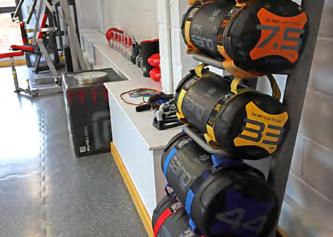

In the Active Zone, you will find the following equipment:
• Treadmill
• Elliptical
• Rower
• Upright bike
• Table tennis table
• Kettlebells
• Sandbags


Please don’t forget to scan the QR code upon entering so the team can keep a track of usage.
A NEW fitness suite, including cardio and resistance machines, is now also open at University Centre Shrewsbury.
The suite consists of:
• A treadmill, bike, elliptical and rowing machine
• Chest press, cable machine, rear delt row, leg press and leg extension/leg curl
• Small barbells, kettlebells, sandbags and mats
The suite, on the lower ground/car park level, is free to all staff and students and is accessible with a uni card, from 8am to 8pm, Monday to Friday, by scanning the card reader.
You can register using the QR code on this page, and selecting Shrewsbury from the drop-down list in the registration form. Alternatively, the link to register can be found on Portal in the Sport and Active Lifestyle section at: https://apps.chester.ac.uk/gymregistration/
The welcome/induction video can also be watched at: https://www.youtube.com/watch?v=b5AX9rH3i5w
COLLEAGUES in the Faculty of Education and Children’s Services’ Initial Teacher Education Department are delighted to be celebrating its re-accreditation as a provider of initial teacher education, leading to qualified teacher status, from September 2024 onwards.
AN interest in gardening to improve mental health and wellbeing by an academic has featured on one of TV’s leading horticultural programmes.
Dr Si Poole, Associate Professor of Cultural Education appeared on Gardener’s World on BBC 2 showcasing his internationally recognised collection of 187 different types of mint. There are currently only three such collections of mint in the UK, with Si’s being the largest here and possibly in Europe, in terms of the number of types.
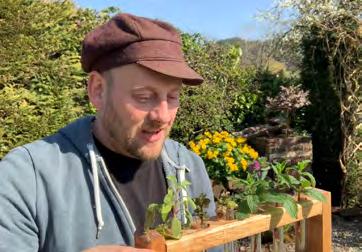
Si shared how found gardening a “solace, a fascination and a way of relaxing and reflecting.” He added: “Spending time in the garden is great for having a think.”
From the Corsican mint in Crème de Menthe through to Apple mint used for apple sauce through to mint from the Middle East, Si gave tips and advice on how to propagate the plants and how to make sure the more vigorous ones don’t take over the garden!
He also shared how growing the plants helped him with the grieving process when his father passed away three years ago. He said he was spending more and more time in the garden, especially in the evenings and he realised the nurturing process was part of the healing process.
Si’s mint plants have been recognised by the National Plant Collection, a conservation scheme run by Plant Heritage, through which individuals or organisations can document, develop and preserve a comprehensive collection of one group of plants in trust for the future.
Si added: “I didn’t expect to love mint as much as I’ve ended up loving it! I didn’t realise there were so many varieties - 187 plants later and you can get hooked!”
To watch the programme visit here.
The rigorous accreditation process required providers to demonstrate their ability to deliver research-informed and evidenced-based, high quality teacher training against the benchmarks of the new ‘Quality Requirements’ for initial teacher education and the team rose to the challenge.
The team has been working, in collaboration with its partners, on the various stages of the DfE’s Market Review since summer 2021 when the proposals for reform were first put out for consultation.
This success is testament to the hard work of the team over many months in preparing its comprehensive and collaborative application, along with the commitment and dedication of staff to embrace and respond rapidly to new DfE polices such as the Initial Teacher Training Core Content Framework.
Over the coming months, the Faculty’s expert staff will continue to work closely with the DfE, partner schools, settings and teaching hubs/alliances to build on the University’s established history in teacher education in readiness for delivering its new curriculum for effective, high-quality teacher training and equip our students to become the great teachers of the future. It is and remains an Ofsted graded ‘Outstanding’ provider of primary and secondary initial teacher education.
INNOVATION in sustainability has earned the University’s Catering team national recognition.
The team has won the prestigious Sustainability Award from The University Caterers Organisation Ltd (TUCO), beating tough competition from Higher Education Institutions from across the country.
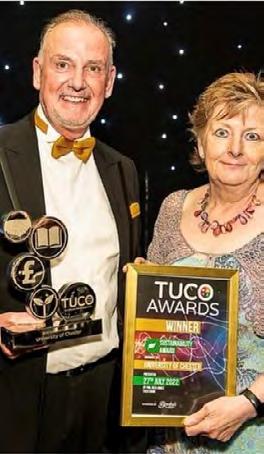
The judging panel looked at how catering teams kept sustainability at the top of the agenda despite the challenges of the pandemic.
The team has worked hard over the past seven years to put its sustainability goals into meaningful and quantifiable action that involves students and staff at every level.
This has been clearly demonstrated by its Garden 2 Table initiative, which has been developed over the last 18 months across all the University sites. The aim of the project was to reduce food waste, raise awareness of food sustainability with students and work closely with the Grounds and Gardens team to ensure students understand where their food comes from.
The project’s initial motivation came from being able to grow fruit, vegetables and flowers in the borders and greenhouses on the University’s premises and replace the previously grown annual flowers. The two teams worked together to repurpose and make full use of University land to grow food for catering outlets and to sell in the community fridge in the Sustainability Shop on the Exton Park site.
Using home-grown fruit, vegetables, herbs and spices, the Catering team creates menus for
its sites, ensuring that meals for students are healthy and locally grown, reducing the food mileage of the food on offer and keeping food waste low. Abundant food is donated to the Greenway Grocer, a sustainable bike service that collects fruit and vegetables to be given away in the local community.
Any food not used in catering outlets becomes part of the team’s TooGood-to-Throw scheme, where leftover food from the catering outlets is available for customers to buy as a takeaway meal.
The Grounds and Gardens team aims to increase the students’ understanding of food provenance through activities such as the student fruit picking trail through the University’s fruit orchards and student sessions on the allotment. Head Chef, Chris Murphy, offers cooking sessions during Induction Week on healthy, sustainable cooking practices and cutting food waste.
The new onsite beehives are producing honey and jams, and chutneys are also being made from home-grown produce. Menus also promote many plant-based dishes.
The Grounds and Gardens team sells spider plants that students can use to personalise their rooms. And flowers, plants and bulbs are sold in the Sustainability Shop, which also stocks pasta, rice and other items
that the University has been able to buy in bulk and students can buy using their own containers.
A keep cup scheme, where customers are given a reusable cup for £2, has saved more than 73,000 takeaway cups from being thrown away since the scheme was launched.
The TUCO awards recognise and celebrate the effort, improvement and achievement from its members. TUCO is the leading professional membership body for in-house caterers – supporting procurement and learning excellence and working to provide quality standards and advice to those working in public sector catering.
THE University’s Business School was thrilled to have been shortlisted among the best in the UK and Ireland, in awards known as ‘the Oscars of higher education’.
Chester Business School was a finalist in the Business School of the Year category of the 18th annual Times Higher Education (THE) Awards.
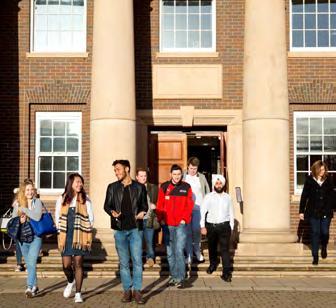
Celebrating stand-out achievements in Higher Education, judges were looking for bold and creative strategies and initiatives that have helped business schools to flourish during the 2020-21 academic year.
The shortlisting recognised how Chester Business School is positioned at the heart of the next clean energy Industrial Revolution and its contribution to the local community and economic prosperity in the North West and beyond. The submission also outlined its commitment to supporting enterprise and entrepreneurialism among students and staff, as well as equipping students with the skills and connections they need to make a difference in their next steps and navigate constant change in emerging business environments.
Professor Kurt Allman, Executive Dean of Chester Business School, said: “We are thrilled to have been shortlisted for Business School of the Year in the 2022 Times Higher Education Awards.
“We’re honoured that our entry was chosen among the six category finalists after sharing our strategy focusing on low carbon business futures and responsible
enterprise, supporting sustainable local growth and regeneration impact within local communities, as well as the globalisation, entrepreneurialism and the full potential of our students.
“This is a credit to everyone at the Business School and our partners, recognising the talent, dedication and innovation of our students, staff and everyone working with us.”
The Business School is a leading partner on three Industrial Decarbonisation Challenge projects, including being the academic lead for HyNet North West, which is critical to meeting national Net Zero targets by 2050.

Chester Business School also secured the largest European funding portfolio of any comparable institution for 2020/21; made an impact through £34.74m of SME (Small to Medium Enterprise) growth and innovation grants, which has generated a GVA (Gross Value Added) improvement of £44.54m for the region (Clatworthy 2021; Mickledore, 2020) and increased international postgraduate admissions by 400% from 2019-20.
Entrepreneurialism is actively encouraged among colleagues and students with initiatives such as Young Enterprise, a Santander-sponsored Enterprise Challenge. Opportunities including subject-matched alumni mentoring undergraduates in employability, are also preparing students to be business-ready graduates of the future.
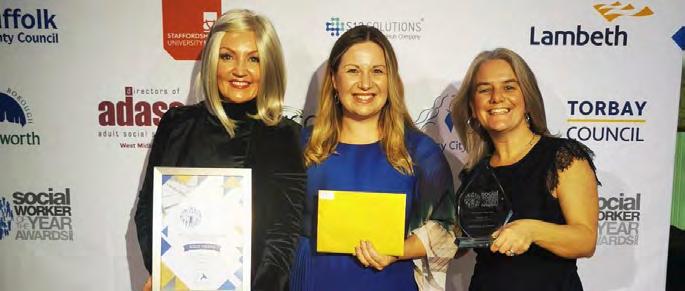
THE University’s Social Work programmes have been named the best in the country at a national awards ceremony.
The programmes, which are based at University Centre Warrington and University Centre Shrewsbury (UCS) have won University of the Year in the annual Social Worker of the Year Awards receiving praise for the commitment to the local community, dedication to diversity and the expertise and support of lecturers.
The team at Warrington deliver a range of programmes including BA and MA Social Work as well as the Social Work Degree Apprenticeship. They are members of the Cheshire and Merseyside Social Work Teaching Partnership working collaboratively with an extensive range of employers throughout the region including Warrington, Halton and Cheshire West and Chester Adults and Children Services.
The Social Work Apprenticeship programme at UCS works in partnership with Shropshire Council Adults and Children’s Services and Telford and Wrekin Adults and Children’s Services
Supported by Coventry City Council, the University of the Year award
recognises outstanding and effective social work education for its students and shaping the social workers of tomorrow into reflective, compassionate and resilient practitioners.
The University’s Social Work Department was praised by the judges for embedding itself in the local community and ensuring those around it directly benefit from social work.
The judges said: “The Department prides itself on involving people with lived experience of social work in its programmes and encourages students to promote a range of local services such as foodbanks and care centres.
“During the pandemic, students developed a project to support homeless people to have a hot meal and change of clothes. The importance of these close local links is reflected in the University’s excellent employment statistics, with many students opting to remain working in the area after completing their studies.”
The judges also highlighted how students benefited from a passionate and supportive team of staff, many of whom are actively involved in research. Social Work England recently praised the
research environment offered by the University which is “clearly having a positive effect as a number of students have been published in peer reviewed journals”.
The supportive environment of the University was also praised. The judges described feedback from students who said that “the University is a place they felt ‘respected, heard and understood’ and the experience on offer as ‘unbelievably positive’ and ‘nothing other than exceptional’”.
The University delivers undergraduate and postgraduate pre-qualifying programmes for Social Work students including an apprentice and a foundation year programme.
Mandy Schofield, Deputy Head of the Department of Social Work at the University, said: “We are absolutely thrilled to win this award. It is down to the hard work and commitment of all our staff and students who go above and beyond every day.
“I am so proud of everyone involved and we will continue to provide the best experience for our students as we equip them to become the social workers of the future.”
EQUALITY, Diversity and Inclusion (EDI) is an important focus for the University and now is the time we look back at the past year to review our achievements and look forward to the actions we will take in the next academic year.
Jules Crane has joined Human Resources as EDI Officer, working with Kathryn Leighton, HR Manager for Diversity. Jules’s role has a strong focus on data gathering and reporting to inform our EDI priorities.
2021/22 saw almost 2500 staff, students and visitors register to attend the amazing range of events that took place as part of the Diversity Festival 2022. Recordings are available to catch up on, if you missed any events or would like to watch any again and the EDI team are currently looking forward to February 27 to March 10, 2023 when the next Festival will take place.
The staff networks continued
to grow in numbers and met throughout 2021/22 to support one another, share information, raise issues and network together. The Parents’ and Women’s Network moved toward a hybrid meeting approach which worked well and will continue for 2022/23.
The Race Equality and Cultural Heritage (REACH) Network hosted a REACH development conference on October 13, building on the learning gained when two of the network members undertook the Advance HE Diversifying Leadership programme.
A new Men’s Network was established in April and the group are working hard to develop an event on Friday, November 18, where staff and students of all genders from across the University are invited to attend a series of events to mark International Men’s Day. The aims of the events are to bring people together to address issues
affecting men and encourage the sharing of experiences, to reflect the International Men’s Day themes of making a positive difference to the wellbeing and lives of men and boys and promoting a positive conversation about men, manhood and masculinity.
In addition, the staff LGBT+ staff group has undergone a number of changes and will be relaunched in the forthcoming year. This follows on from the University’s involvement in and sponsorship of Chester Pride 2022.
Eight staff were also funded to attend Advance HE’s Aurora programme in 2022, a successful women-only leadership development programme and applications are currently open for a further eight staff, who would like to develop their career and explore the avenues to leadership, to apply for the programme in 2023.




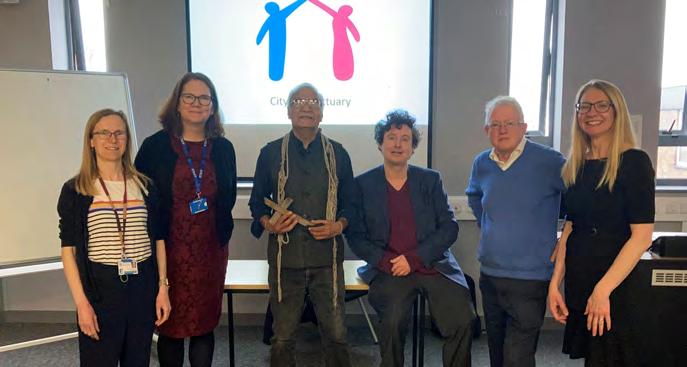 If you would like further information on any of the EDI initiatives detailed in this article, please visit the EDI pages on Portal or contact: equality@chester.ac.uk
Dr Helen Galbraith, Pro Vice Chancellor (Student Experience); Prof Helen O’Sullivan, Provost and Deputy Vice-Chancellor; Dr. Rev. Inderjit Bhogal OBE, Founder and President of City of Sanctuary; Dr Mark Bendall, Senior Lecturer - Social and Political Science; Richard Gillespie, Chester City of Sanctuary and Kathryn Leighton, HR Manager – Diversity, at Sanctuary Seekers during the Diversity Festival 2022. City of Sanctuary holds the vision that the UK will be a welcoming place of safety for all and proud to offer sanctuary to people fleeing violence and persecution.
If you would like further information on any of the EDI initiatives detailed in this article, please visit the EDI pages on Portal or contact: equality@chester.ac.uk
Dr Helen Galbraith, Pro Vice Chancellor (Student Experience); Prof Helen O’Sullivan, Provost and Deputy Vice-Chancellor; Dr. Rev. Inderjit Bhogal OBE, Founder and President of City of Sanctuary; Dr Mark Bendall, Senior Lecturer - Social and Political Science; Richard Gillespie, Chester City of Sanctuary and Kathryn Leighton, HR Manager – Diversity, at Sanctuary Seekers during the Diversity Festival 2022. City of Sanctuary holds the vision that the UK will be a welcoming place of safety for all and proud to offer sanctuary to people fleeing violence and persecution.
A LECTURER has shared his passion for football with the publication of a book on two management legends.
Dr Christopher Hull, Senior Lecturer in Spanish and Latin American Studies, has turned a lifelong passion for Hartlepool United into a reality with his new book, Alchemy: Brian Clough & Peter Taylor at Hartlepools United (The History Press).

With research from archive newspapers and interviews with surviving players, Chris reveals the humble origins of Clough and Taylor’s rise to the top.
Despite growing up in London, Chris has followed Hartlepool United since 1978. He said: “After watching the team for the first time in 1978 I was hooked. I’ve been travelling around the country to watch them ever since.”
Chris particularly enjoyed interviewing players and reading newspapers from the time. He said: “The players fondly remember those seasons in the 1960s, the camaraderie in the dressing room, although it was very much a raw experience, playing for a club with the most basic of facilities and always scratching for money.
“Reading the regional newspapers of the period was a joy too, and Clough’s match programme notes, all carrying his golden quotes. He was a football correspondent’s dream, always providing them with great copy, and a boon to a writer like me. Reading newspapers from that period, you really become immersed in those seasons, the struggle
FOLLOWING the inspirational win by England’s Lionesses football team, a regular women’s football game is being set up for staff at the University’s Exton Park site.
Ali Burkett, BUCS (British Universities and Colleges Sport) Development Officer and Katie Mayers, Fitness Facilities Co-ordinator, both enjoy playing football and were inspired to encourage others to join them.
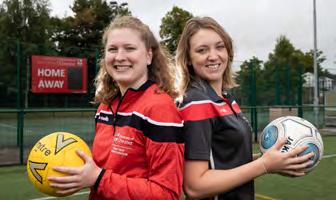
The friendly games are for anyone and all levels of experience and fitness are welcome to join in. The sessions will take place at the MUGA pitch on Mondays and Thursdays between 12pm and 1pm.
Ali said: “Katie and I wanted to set up these games
to improve results and move out of the danger zone at the bottom of the Fourth Division, with minimum financial resources. It was a battle for survival at every level. Not forgetting, of course, that Clough was trying to make it in football management after the premature and tragic end to his high scoring playing career through injury in 1962. In that sense, there is a parallel between the man, the football club, and the local town (or towns, Hartlepool and West Hartlepool being separate towns until April 1967), already suffering steep industrial decline by the mid-1960s. All three, Clough, Hartlepools United, and the Hartlepools, were down on their luck.”
Chris found his passion for the subject the key to managing his time and he advises his students to do the same.
He added: “My interest in the topic and keenness to research and write about it were sufficient motivations for me to dedicate holidays, evenings and weekends to this project. I advise my dissertation students to find a topic that interests them and that will suck them in.”
To buy a copy visit here.
to play for fun and create a community for staff through women’s football.
“We will start with practice drills and hopefully move on to having enough people to play friendly games. It is open to all staff of any ability and you don’t need to have played football before.”
Interested players can email k.mayers@chester.ac.uk
Dr Christopher Hull.
WITH the embedding of the Citizen Student Strategy at the University, ensuring a premium, personalised and purposeful student experience, a recent restructuring has brought together a new team - the Student Success team, within Careers and Employability. This consists of the Advice and Information team, the Training team and the Venture team and, moving across from Student Services, the Volunteering and Mentoring team. Led by the Student Success Team Manager, Vikki Brockhurst, the Student Success team brings together several frontline and student-focused initiatives to enable students and graduates to access a breadth of activities to enhance their experience, celebrate diversity, build flexibility in their career pathway, create a strong sense of belonging and enable them to have a positive influence on society.
The initiatives consist of; the Chester Difference Award, a skills award which provides the opportunity for students to gain recognition for a range of extracurricular activities and develop techniques to showcase their skills and experiences to future employers; the Venture Programme, designed to help students and graduates develop the skills, knowledge, confidence and connections to work for themselves,
whether that’s starting their own business or building a freelance career; Careers Workshops, giving students and graduates the opportunity to develop knowledge and learn techniques to help prepare for and find a job, whether that’s whilst they are at university or after they graduate and Volunteering and Peer Mentoring, supporting students to get involved with a range of volunteer and mentor opportunities within the University and local community, enabling them to develop new skills, meet new people and have an impact and positive influence on their peers and society. Bringing this all together under one focal point, where they have a point of contact, whether they want questions answered, advice on how to engage and get involved or advice on getting the most out of the initiatives, completing application documents as part of the initiatives or for the end process, the Advice and Information team is dedicated to ensuring that Careers and Employability is accessible, supportive and welcoming.
The participation of students and graduates in these unique initiatives has already had an impact with entrepreneurial students and graduates having been successful in securing a share of £5,000 startup funding, courtesy of Santander Universities UK, as part of the
University’s Venture Programme; with the Volunteering and Mentoring team coming together with students, staff and charities, in their yearly University of Chester Volunteering celebratory event, to mark the achievements and contributions to society throughout the year, including students who gave an impressive 8,461 hours to 112 organisations; the Chester Difference Award which has over 1000 participants and 97% of Careers Workshop attendees providing feedback agreeing that the session they attended met their expectations.
Through the initiatives and support delivered through the Student Success team, the aim is to continue to break down those barriers for students from disadvantaged backgrounds making opportunities and life goals accessible and support students to transition to graduate life and continue to have an impact on society.
Diane Appleton, Head of Careers and Employability said: “The reorganisation of Careers and Employability into four teams and establishing the Student Success team enables us to focus on improving student engagement and delivering activities that enable students from all backgrounds, particularly those from under-represented groups to make effective and successful transitions from pre-enrolment to entry into the graduate job market. We will ensure students’ voices are heard to encourage their participation, realise their potential and develop their social capital throughout their student journey.”
For further information about the work of the team please call 01244 513066 or email careers@chester.ac.uk
TECHNICIANS from the University joined others from across the country to celebrate the achievements gained from a national leadership programme which has been developed to tackle the workforce imbalance and equality gap within the UK’s technical community.
The University has been a signatory of the Technician Commitment since 2017 and aspires to engage with opportunities nationally/ regionally/locally that ensure visibility, recognition, career development and sustainability for our technical community across all disciplines.
The Herschel Programme for Women in Technical Leadership, named after Caroline Herschel - a pioneer in the discovery of comets and an early ‘technician’ - concluded its sixmonth pilot with a celebration event in London.
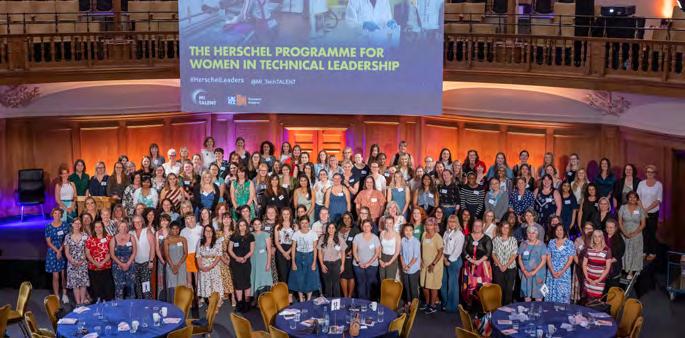
Sam Sinclair, Faculty Technician Coordinator in Education and Children’s Services; Sandra Franks, Learning Technologist in LIS and Kate Peters, Senior Demonstrator in Biological
Sciences, took part in the programme delivered by the University of Nottingham and the Research England funded Midlands Innovation TALENT programme.
Co-created with technical and organisational development experts to address topics specifically relevant to women in technical roles, the programme set out to elevate and advance career opportunities. Lack of diversity is one of the biggest challenges impacting the future and sustainability of the technical community, highlighted by HESA (2018/2019) workforce data which identifies 31% of senior technical staff are female and 60% of the total workforce is male.
The programme provided opportunities for participants to learn new skills to further develop their technical leadership capabilities so they can build on their personal, professional and organisational potential as well as having the time to network and share knowledge and insights with others on the
programme.
Julie Mulliner, Human Resources Manager, Health and Wellbeing, said: “The University is delighted that three of our colleagues were supported to engage with this national programme that aims to address the lack of women in technical leadership positions.”
Kate said: “I absolutely loved taking part in the Herschel programme this academic year. As well as helping me to develop valuable leadership skills, it also highlighted the importance of having a network of like-minded people and a safe space to talk through work matters. I would encourage colleagues to take part in any future events.”
Sam added: “It was a real honour and pleasure to meet so many likeminded women from a wide variety of technical disciplines who had many similar experiences. The action learning sets we took part in enabled us to share issues and solutions in a very effective way. The programme as a whole was excellent and well organised.”
HOW to develop dialogues for a culturally responsive art and design education was explored in a conference this term.
Belonging was an online conference hosted by the International Journal of Art and Design Education (iJADE) and the National Society for Education in Art and Design (NSEAD) which took place from Friday, November 11 to Sunday, November 13.

The conference was organised by one of RECAP and the Faculty of Education and Children’s Services Research Fellows, Dr Deborah Riding and RECAP Co-Director, Dr Emma Arya-Manesh.
It focused on how during times of political, economic, environmental, and societal turbulence, Culturally Responsive
Education challenges everyone. The conference explored ways Art and Design Education can be relevant to the lives of all learners, including their varied social worlds, identities and intersections, their backgrounds, heritage, and lived experiences.
The iJADE journal is attached to the learned society NSEAD and is hosted and managed within the University. Both have close ties to the University’s RECAP Centre (Research into Education, Creativity and Arts Through Practice) – a hub that specialises in practicebased research focusing on creativity, learning and the arts in professional, educational context.
Emma is the Journal’s Editorial Assistant and Deborah is the Principal Editor. Both iJADE and
NSEAD have a 12-year history with the University by providing funding to support work which is still ongoing.
The Interna onal Journal of Art & Design Educa on

I first became involved with RECAP through my role at Tate Liverpool and the organisation’s partnership with the University. Through the partnership I was involved in the Beyond Text research project. I also had a more personal connection through my PhD and some of the teaching I was involved in through the centre. My PhD explored epistemology in the public art museum and had synergies with the work that was evolving through RECAP, which at the time was co-directed by my
supervisor Professor Emeritus Jeff Adams.
Can you share some examples of the work you do in this role?
Since completing my PhD
I was invited to apply to be a Visiting Research Fellow for the Centre. I have been involved in exploring and shaping potential partnerships and funded research projects and funding applications. I am the Principal Editor for the International Journal of Art and Design Education and was keen to bring the Journal to the University of Chester and create a home for
it within RECAP. The Journal is the research publication of the National Society for Art and Design Education (NSEAD) and as such explores the intersections between creative practice, research and education; a perfect fit with the focus of the research centre. My hope is that the Journal’s reputation and international reach will benefit the Centre, raising its profile and providing opportunities for special issues and joint events.
Working with RECAP connects me with academic colleagues and research activity that is difficult to have access to when working outside of higher education. I have always been based in cultural organisations throughout my career, working between them, creative practitioners and the education sector. RECAP connects some highly experienced and innovative international researchers. We all have particular career backgrounds, research interests and methodological expertise all focused on creative practice and research. I am working on projects with the health sector at the moment and developing cultural and creative programmes and research from a range of artforms in this context. This is providing a great opportunity to explore and test approaches against health and wellbeing criteria, increasingly significant within the work that we do as arts educators.
All of us working in education have been concerned with developing culturally inclusive and responsive curricula in
for a culturally responsive art & design education
Online Conference, Friday 11 - Sunday 13 November 2022
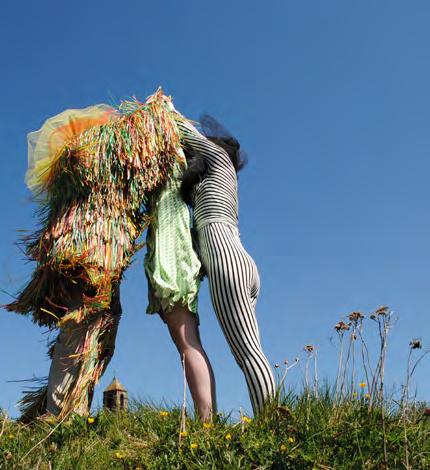
Conference Registration: ijade-2022-belonging.eventbrite.co.uk
Online Abstract Submission Form: https://chester.onlinesurveys.ac.uk/abstract-submission-ijade-online-conference-2022
recent years. We touched on this theme in last year’s iJADE conference, Hybrid Practices and feedback from delegates was that they were keen to explore it further. The iJADE Conference brought together international art educators and researchers from a range of contexts across all phases of education. As such it always creates opportunity for intellectual and practical dialogue in a supportive and generous space. This year’s programme for Belonging: Dialogues For a Culturally Responsive Art and Design Education brought together a fantastic line-up of keynote speakers who introduced some
really rich and engaging ideas and debates. Alongside the keynotes, the iJADE Conference has become known for the range of papers presented from teachers, artists, academics and students.
We are already planning the iJADE Conference for next year and looking forward to our first face-to-face event since 2019. The Conference will be a joint event between the University and in particular RECAP, NSEAD and Storyhouse.

LINKS forged for almost 150 years between the University and Gladstone’s Library have been reinforced with a joint publication which offers insights on the significance of everyday objects and consumer culture in the Victorian era.
Edited by a Professor from the University, Deborah Wynne, and former student, Dr Louisa Yateswho is now Director of Collections and Research at the Flintshire Library - Victorian Material Culture explores the most important developments in manufacturing history, across the 19th century.
The book is part of a six-volume collection discussing everything from chatelaines - sets of short chains on belts to carry items - to whale blubber, and ice making machines to stained glass.
With the Industrial Revolution and new commodities, the new publication offers a unique insight into the way Victorians responded to the production and consumption of manufactured goods.
The volume, IV - Manufactured Things, brings together a range of primary sources on Victorian manufactured items and the cultures associated with them, considering mass produced industrial and domestic objects including fabrics, clothing, carpet, paper, cutlery, locks, keys, ceramics, glass, soap and candles.
Deborah said: “The Industrial Revolution saw the rapid expansion of technology and the development
of factory production, and developments in consumerism characterised this period. Lives were transformed in terms of increased access to the ownership of objects.
“Providing a new perspective, this collection addresses important questions about how we classify and categorise 19th-century things - and demonstrates the significance of objects in the everyday lives of the Victorians.
“It has been an honour to work with Dr Yates and explore the archives at Gladstone’s Library to create this volume, and continue a long history of the institutions working together.”
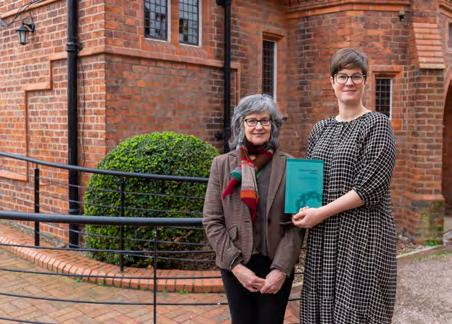
Louisa added: “Not only have I been extremely lucky to be able to work with Professor Deborah Wynne but it’s been a wonderful opportunity to highlight the historic
collections in some of the UK’s most significant cultural institutions.”
For further information on the book, published by Routledge, visit here
Gladstone’s Library, in Hawarden, is the UK’s finest residential library, and the UK’s only Prime Ministerial library, built following a bequest from William Ewart Gladstone, Victorian statesman and four-times Prime Minister of Great Britain. The current building, raised in 1902 and designed by John Douglas, was funded by public subscription, and the organisation is a self-sustaining registered charity.
The college which would become the University of Chester was founded in 1839 by such pioneers as Gladstone.
For more details on Gladstone’s Library, visit here
COLLEAGUES who have achieved 10 and 25 years’ service at the University and its predecessor institutions joined those who have completed the Certificate of Supervisory Management and Advance HE’s Aurora development programme at a recent celebration event.
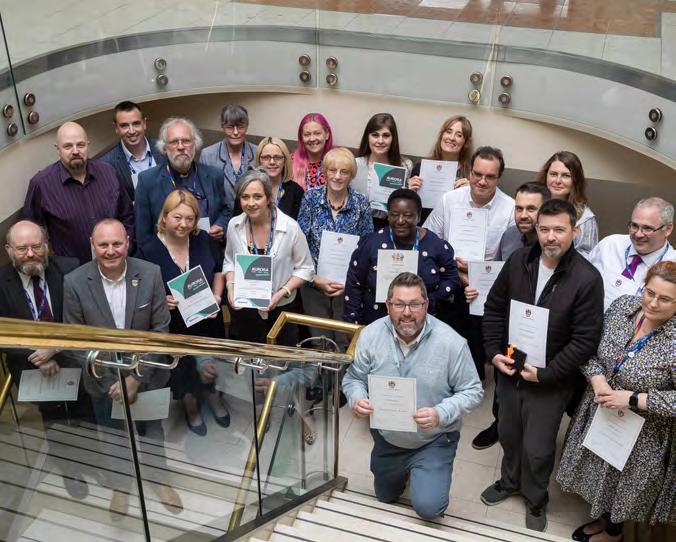
The gathering was held at the Queen’s Park Brasserie and hosted by Richard Waddington, Pro-ViceChancellor (Resources) and Bursar/ Chief Financial Officer with Rashmi Patel, Director of Human Resources, who highlighted the varied career
journeys of the recipients of the 25 years’ service awards.
Feedback from those who attended included: “It was a really enjoyable event and exceeded my expectations. It was an absolute pleasure to support colleagues being awarded and recognised for their efforts. The location was good and the fizz and cake was a nice touch!” and “I thought it was really lovely to be recognsied in this way”.
As well as the recognition for 10 and 25 years’ service, colleagues who are entitled to 22 days’ annual
leave receive an additional five days’ leave (pro rata for part time staff) after five years’ in post.
Paul Humphries, Senior Lecturer, Chester Business School; Catherine Bartley, Finance Assistant, Finance; Janice Beech, Cashier/Catering Assistant, Catering Services; John Clipperton, Administrator, Sport and Active Lifestyle; Michelle Turner, Assistant Director, LIS; Susan Hultum, Assistant Subject Librarian, LIS; Lisa Thomas, Deputy
Director, Marketing, Recruitment and Admissions; Fiona White, Departmental Secretary, Music, Media and Performance, Faculty of Arts, Humanities and Social Sciences; Dr Elizabeth Wheelan, Senior Lecturer, Psychology, Faculty of Arts, Humanities and Social Sciences; Janet Chadwick , Senior Student Record Systems Officer, Registry Services; Penny Gibson, Departmental Administrator, Social and Political Sciences, Faculty of Arts, Humanities and Social Science and Valerie Lane, Senior Administrator, Universities Economic Development Unit.
10 years
Vikki Brockhurst, Student Success Manager, Careers and Employability, Directorate of Access, Skills and Apprenticeships; Dr Lisa Rowe, Associate Professor, Centre for Professional and Economic Development; Rev Canon Dr Peter Jenner, Senior Chaplain and Dean of Chapel, Chaplaincy; Keith Chandler, Senior Lecturer, Chester Business School; Vicki Silver, Senior Lecturer, Faculty of Education and Children’s Services; Zoe Garratt, Administrator, Faculty of Education and Children’s Services; Dr Joanne Close, Deputy Head of Department, English, Faculty of Arts and Humanities; Gordon Reay, Senior Operations Manager, Sports and Active Lifestyle; Sean Baker, Senior Lecturer, Acute Adult Care, Faculty of Health and Social Care; Michael Jones, Administrative Assistant, Faculty of Health and Social Care; Dr Amy Gray-Jones, Senior Lecturer, History and Archaeology, Faculty of Arts, Humanities and Social
Sciences; Stewart Brotherston, Graphic Design Manager, LIS; Mark Heard, Senior Project Officer, LIS; Jonathan Ivison, Senior Project Officer, LIS; Steven Markham, LIS Assistant Desktop and AV Support, LIS; Stephen Roberts, LIS Assistant, LIS; Sam Vanderzijl, Senior Project Officer, LIS; Lee Border, Customer Services Manager, LIS; Caitlyn Hallman–Lewis, Assistant Subject Librarian, LIS; Frances Shelley, LIS Resources Assistant, LIS; Angela Evans, Web Assistant, Marketing Recruitment and Admissions (MRA); Niall Farrall, Market Research Manager, MRA; Sarah Markillie, Digital Marketing Manager, MRA; Anna McLachlan, Senior Marketing and Recruitment Co-ordinator, MRA; Dr Shelley Piasecka, Associate Professor, Music, Media and Performance, Faculty of Arts, Humanities and Social Sciences; Emma Chu, Widening Participation Officer, Outreach Team, Directorate of Access, Skills and Apprenticeships; Dr Julie Kirkham, Senior Lecturer, Psychology, Faculty of Arts, Humanities and Social Sciences; Dr Linda O’Neill, Senior Lecturer, Psychology, Faculty of Arts, Humanities and Social Sciences; Helen Berrie, Research and Development Officer, Student Services; Susan Shand, Student Support Funds Officer, Student Services; Daniel Griffiths, International Admissions Coordinator, The International Centre; Sophia Minshull, Administrator, The International Centre; Dr Matthew Collins, Senior Lecturer, Theology and Religious Studies, Faculty of Arts, Humanities and Social Sciences; Dr Ben Fulford, Deputy Head of Department, Theology and Religious
Studies, Faculty of Arts, Humanities and Social Sciences; Carly McEvoy, Departmental Secretary/PA, Theology and Religious Studies, Faculty of Arts, Humanities and Social Sciences; Patricia Spillane, Senior Contract Co-ordinator, Universities Economic Development Unit and Neil Clatworthy, Director (Europe and Resources), Universities Economic Development Unit.
Jennifer Donald, Campaigns and Events Officer, Corporate Communications; Kathryn LiveseySim, Practice Learning Support Office Manager, Faculty of Health and Social Care; Patricia JonkerCholwe, Weekend Helpdesk Supervisor, LIS; Caroline Major, Administrative Assistant, Chester Medical School; Jonathan Shanks, Customer Services Assistant, LIS, and Rebecca Turner, Laboratory Manager, Biological Sciences.
Aurora Galina Georgieva, Administrative Assistant, Commercial Operations; Dr Claire Lucas, Senior Lecturer, Chester Medical School; Dr Katie Lloyd, Lecturer, Chester Medical School; Caroline Major, Administrative Assistant, Chester Medical School; Jill Pye, REF and KEF Manager, Research and Innovation Officer; and Dr Anjali Shah, Senior Lecturer, Faculty of Education and Children’s Services.
• Colleagues awarded in 2022 reached the service milestones by March 31 2022.
DID you know that since 2020, the University has been working with Cheshire West Voluntary Action (CWVA) on a joint Citizen Academic project?
This partnership gives staff the chance to become trustees of local charities, community groups and charitable organisations and offer support around areas such as governance, funding, training, and volunteering.
As part of the project, CWVA has created profiles so they can match University staff with a well-suited organisation, helping to put in place their strategy and vision and making sure they are governed correctly.

The initiative was set up by Dr Holly White, herself a trustee of CWVA and our Deputy Head of Social and Political Science.
She said: “Becoming a trustee gives our staff the chance to support a community and an area of personal deep interest and concern.”
Rebecca Collins, Deputy Head of Department and Senior Lecturer in Human Geography, recently became a Trustee of the Cheshire Wildlife Trust, through the project.
She said: “I’ve loved my experience so far and, even
though I hope the charity would probably say I’ve made some useful contributions since I joined the Board, I feel like I’ve gained more than I’ve given.”
Jan O’Driscoll, Director of Foundation Years and Associate Professor, has started two roles with both Chester Cathedral Education Trust and Winsford Youth and Community Forum (WYCF) after being matched through the project.
She said: “Seeing the amount of work charities do, whether their services are free or subsidised, is amazing.
“I’m brand new to being a Trustee and it all works well alongside what I do at the University.
“It’s a great opportunity to work with different people outside my university role and the community engagement offers a civic connection between the University and local area.”
If you’re interested in the Citizen Academic project and the opportunities that could be available to your organisation, please email enquiries@chesterva.org.uk and the team at CWVA will help match you with one of its members, or contact Dr Holly White at h.white@chester.ac.uk
THE memory of much loved and respected colleague Rachael Bate was celebrated at a ceremony held at the University earlier this term.
Rachael, known as Rae, was the Departmental Administrator in the Department of Social and Political Science from 2014, but her links to the University went back further. She began working at the University in the Faculty of Health and Social Care in 2006, before moving to the Faculty of Education and Children’s Services in 2009. She was also a student at the University as an undergraduate, postgraduate taught and postgraduate research student.
A passionate advocate for a nature and the environment, Rae was a green champion and led initiatives to reduce,
reuse and recycle, organising events to raise money and awareness for various charities close to her heart, including Cancer Research and the Neuro Foundation, which researches Neurofibromatosis.
Rae was also a Mental Health first aider and was adept at providing a listening ear to students and staff.
Earlier this term, colleagues, friends and family gathered at a memorial event which saw a special bench dedicated in her memory at Exton Park.
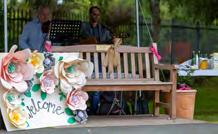
Paul Taylor, Head of Social and Political Science, said: “Rae was a very caring, social person and the Department will aim to continue our work with Rae’s example of helping others, in our minds.”
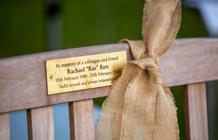
Walking:
Sunday, December 11 2022 Christmas Walk and Meal –Loggerheads Country Park - C Grade
Players competed for the coveted Claret Jug trophy on Friday October 14. The players ranged from beginners to semi-seasoned pros. This will be an annual tournament and the Association will try to pick challenging courses for its players. If you’re interested in being notified of any future events, please email Paul Fletcher on p.fletcher@chester.ac.uk
The Association is really pleased to announce the Staff Christmas Party will be making a welcome return on Friday, December 16 in The Bar at Exton Park. Tickets will be £10 per person and posters advertising the event will be distributed over the next few weeks. Make sure you put the date in your diaries!
Theatre trips and other events are also being planned. Please see the link below for details when confirmed: https://portal1.chester.ac.uk/staffassociation/Pages/ default.aspx
Events are open to ALL staff – there’s no joining involved. Please contact Deslie Bailey d.bailey@ chester.ac.uk or Paul Fletcher p.fletcher@chester.ac.uk for more information or if you are interested in joining the team.
THE Staff Association team is busy and excited to be arranging events again now that it is able to do so. Here’s an update on what they have been up to and some exciting things to look forward to.
The group’s first walk since the pandemic took place in October 2021 around Frodsham and Helsby Hills. It was so good to see everyone in real life and not on the screen. Walks around Llangollen, Halkyn and Delamere Forest followed but, unfortunately, the annual Sunset on Snowdon walk had to be cancelled due to bad weather.
In June Deslie, Dennis Holman and Dr Helen Southall took part in the Hospice of the Good Shepherd’s Sparkle Walk to raise money in memory of our dear friend Rachael “Rae” Bate, who is sadly missed, and that of Dennis’ wife, Jan. The Staff Association has also arranged for a University rose to be planted near Critchley in Rae’s memory.

July saw the retirement presentation for Professor David Balsamo, after 31 years at the University. There have been several other members of staff who have retired but not wanted a formal presentation and a gift/ donation and flowers have been provided on their behalf.
 Professor David Balsamo’s retirement presentation.
Professor David Balsamo’s retirement presentation.
FROM the over-promising of global music festivals and concerts to motor racing safety failures - a new book co-edited by a Chester academic is looking at what can be learned from the mistakes made in managing events.
Using case studies including the notorious 2017 Fyre Festival, a 1984 concert by Frank Sinatra that did not go to plan and the 2018 Macau Grand Prix, Events Mismanagement examines events from the viewpoint of how and why they fail and what can be taken from this.
Bringing together a range of expert insights, contributors discuss how core planning theory and concepts fail to emerge in practice and the reasons for this, how to improve practice through learning about event failure, how to avoid risks, and reduce the chance of events failing so they can be safer and successful.
Each chapter looks at different aspects of events mismanagement, exploring a wealth of international examples from music and sporting events to product launches and community and corporate events, with the case study approach offering a consistent thread and links throughout the text.
Lead Editor, Dr Tim Brown is Programme Leader and Senior Lecturer for Events Management, and Senior University Teaching Fellow, at the University of Chester’s Business School

Joining him in the editing role is Phil Higson, Senior Fellow of the Higher Education Academy and former Head of Tourism and Events Management at the University of Chester Business School, and Lindsey Gaston, Senior Lecturer in Events Management at Liverpool John Moores University.
The book also highlights the rising stakes and expectations, with the events industry in the UK alone estimated to contribute more than £70 billion in direct spend, accounting for over 50% of the UK visitor economy (BVEP, 2020).
Tim, who also co-authors a chapter on free-toattend events, said: “It could be argued that learning from mistakes is the most fundamental type of learning we have all used, as we grow and develop. Therefore, this book embraces this core ideology of ‘learning
from failure’, and is concerned with events mismanagement, as opposed to events management - of which there is an abundance of excellent books, articles, and papers. It aims to bring a new perspective to understand how to overcome the issues and reduce the likelihood of failure in the future.”
For further information on Events Mismanagement, please visit:
Events Mismanagement: Learning from failureGoodfellow Publishers
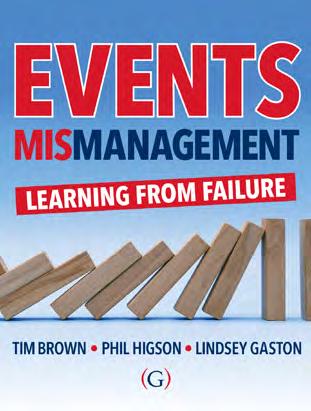
IN the early 1990s, Art and Design Lecturer, Stephen Clarke was teaching photography at a sixth form college on the south coast of England. When one of his students decided to make promotional photographs of a local dance troupe, Stephen took the opportunity to document the proceedings and capture a more informal set of images.

Stephen said: “These black-andwhite photographs were not meant as promotional material, instead the pictures show a behind-the scenes tableaux as the dancers get in to position for poses.”


The photographs of the Hampshire-based dance troupe, called Bezique, have laid dormant in a portfolio for 30 years, along with additional pictures in Stephen’s negative files. They have remained
unpublished until now and have not been exhibited.
Stephen added: “They represent a moment in time. Three decades on, the glitter and glamour of that moment may be gone, and what remains is the memory.”
The project has been picked up by the independent photobook publisher, Fistful of Books, based on the Wirral. The photographs have been released as a book titled All that Glitters. Stephen gave the publisher licence to be playful with his photographs - so the images have been colour-tinted and solarised to add to the glamour of the subject.
The spiral-bound book was launched at the Bristol Photobook Festival in October, and more details are available here.
The book complements work that Stephen exhibited at the University’s

Contemporary Art Space Chester (CASC) gallery during the summer, as part of the exhibition, ‘Emerge’.

Stephen exhibited collages he has made, since the early 1980s, from sellotape, glossy magazines and paperbacks, influenced by the Punk processes of the 1970s.
He said: “My collages incorporate fragments of images and pieces of text that are melded into a new image, usually a female mannequin that acts as a contorted anagram of the glamour model. Over the years, my collages have become more refined, less abrasive and more ambiguous.”
The collages have been exhibited at numerous venues around Britain, and locally, including being selected on several occasions for the Grosvenor Museum’s Open Art Exhibition in Chester.
PRESERVING the memory of an uprising against the communist regime in 1950s East Germany has led to a University academic speaking in a city which was one of the main centres of the unrest and featuring on its regional TV.
Dr Richard Millington, Senior Lecturer and Programme Leader for German, presented a public lecture at Magdeburg City Hall on ‘The Collective Memory of the Magdeburg Uprising of 17 June 1953’, after being invited by the head of the City Archive. The lecture was recorded by the independent TV station Offener Kanal Magdeburg and broadcast in the summer.
Among the audience were eyewitnesses who revealed their experiences of the day. Presented in German, it shared some of Richard’s extensive research, and was part of the Archive’s summer seminar series of lectures on the history of the city.

Richard said: “On 17 June 1953, more than 500,000 people protested in East Germany against the communist regime. Magdeburg was a centre of the uprising and a particular flashpoint - several police officers and demonstrators were killed in exchanges of gunfire. The uprising ended in the afternoon of June 17, 1953, when Soviet tanks and troops arrived to break up the demonstrations and restore order.

“In 2008, I spent 10 months in Magdeburg interviewing people who had witnessed or taken part in the demonstrations. I also conducted archival research into
how the uprising was remembered by ordinary people in the city in later years.
“It was a great honour for me to be able to present my research to the people of the city. They had helped me so much throughout my project, so it was nice to be able to give something back to them. The response was very positive and it was fascinating after my talk to hear people, one after the other, say ‘I was there and this is what I remember’.”
He added: “The uprising of 17 June 1953 marks a turning point in East German history. The state had only been founded four years prior to the unrest, and the protests showed that ordinary people had had enough of the repression of the regime. After the uprising, however, the government cracked down hard. One of its main measures was to expand its political security service - the Stasi - exponentially. In later decades, this would lead to a society of mass surveillance, with one Stasi informer for approximately every 100 citizens.”
The lecture is available to watch here.
Richard has worked in the Department of Languages and Cultures at the University since 2012. His published work includes State, Society and Memories of the Uprising of 17 June 1953 in the GDR (Basingstoke: Palgrave Macmillan, 2014)

BEES have been trained to roll a ball to a goal matching its colour, as part of research seeking to gain a better understanding of the ability of insects to learn and reason.
Through ball-rolling tasks, Dr Pizza Chow, from the University of Chester’s School of Psychology, and experts from the Ecology and Genetics Research Unit at the University of Oulu, Finland, have highlighted that the right choice of stimuli is paramount, to discover more about the extent to which invertebrates possess aspects of ‘higher’ cognition. These aspects include tool selection, concept learning and causal reasoning, that are comparable to those of humans.
With the footballing skills of the human species in focus for the World Cup, the research on buff-tailed bumblebees (Bombus terrestris) in the ball-rolling tool selection tasks has been published in the international journal, iScience
The bees’ performance was assessed on a platform including three lanes, with the lanes being connected at a central point - ‘the goal’ - and a bordering wall.
Balls of different colours were placed at each end of a different lane. To successfully complete the training, the bee needed to select the ball that matched the platform’s colour and move it to the goal, to be rewarded with a sucrose solution using a syringe. If the bee did not successfully perform the task, a model bumblebee was used to demonstrate how to obtain the reward.

The research found that the colours chosen in the tasks affected the performance of the bees. Therefore, while historically, it has been thought that a small brain and short life limit cognitive abilities, and more recent studies have shown that invertebrates, such as bees, exhibit remarkable performance in some cognitive tasks, the new research has shown that the views of invertebrate cognition to date may have been biased by the choice of stimuli.
Bees trained with blue-and-yellow colours took fewer training bouts to make a match than those trained with yellow-and-orange/red colours. When assessing the bees’ concept learning in a follow-up transfer test with a new colour, the bees trained initially with blue-and-yellow (novel colour: orange/red) were highly successful. Those trained with yellow-and-orange/red (novel colour: blue) failed the test. Bees trained with blue-and-orange/red (novel colour: yellow) did not differ from random results.
These colours are within the perceptual range of bumblebees’ trichromatic colour vision system. However, as perceived by the human eye, blue has been shown to be the innate preferred colour of most bumblebee populations and red, as perceived by the human eye,
appears as dark shades to bees and thus is a more difficult colour for them to perceive. Yellow can be well-perceived and bees are likely to perceive orange/red as dark shades.
Pizza, the lead author, whose research focus is the evolution of cognition, said: “Our findings affect our practice in doing good science: we should diversify stimuli that we use in experiments, if we want to draw robust conclusions when studying animal cognition.
“It is important to increase our understanding of insects’ behaviour and minds so that we can help them in terms of conservation and more. In this case, it is bees because their populations have significantly decreased in recent years.”
Associate Professor Olli Loukola, the project leader, from the Ecology and Genetics Research Unit, University of Oulu, Finland, said: “It’s surprising how complex rules the bumblebees learn in the ball-rolling task. Even more amazing is how much the differences in training affect their performance in the generalisation task.”
He continued: “Determining the cognitive capabilities of insects and what factors contribute to their differences is vital for understanding our own intelligence, how cognition has evolved, and how we approach policies and activities that influence one of the most diverse and abundant groups of animals on the planet.”
To read the paper, also contributed to by Dr Topi Lehtonen and Ville Näreaho, Prior associations affect bumblebees’ generalization performance in a toolselection task, in full, please visit here.
You can also watch a short video of a bee completing the ball-rolling task here
SCIENTISTS at the University are partnering with industry leaders on a new robotic way to maintain wind turbines to ensure their efficiency.

With the world looking towards ‘greener’ methods of creating energy, harnessing the power of wind has become increasingly popular.
The University’s Chester Smart Materials Centre (CHESMAC), based within the Faculty of Science and Engineering, is the only academic partner in the ROMAIN (Robotics Operation and Maintenance) project, an EUfunded initiative for three years to develop a roboticbased inspection and repair system for wind turbine blades both offshore and onshore.
Wind turbines operate for between 20 to 25 years once they are installed and maintenance is essential to ensure they are operating effectively for both environmental and economic benefit. The project covers different research areas with industrial partners from the UK and EU countries including composite damage detection and monitoring, composite material welding, characterisation and assessment, robotics system, Artificial Intelligence modelling and wind farm and energy development.
The project is co-ordinated by EDP Labelec - Estudos, Desenvolvimento e Actividades Laboratoriais SA (Portugal) and involving Alerion Technologies S.L.(Spain), Front Technologies Ltd (UK), Rope Robotics ApS (Denmark), Fundación Tecnalia Research & Innovation (Spain) with together on the project with the University of Chester’s team led by Professor Yu Shi.
Yu’s team will develop the rapid welding technology for the composite repair for onshore and offshore wind
turbine blades and design and integration with the robotic system with project partners. When repairs are detected and required, the robotic will be deployed to repair the faulty area of composite components. The aim of this maintenance work is to lower the bills for using wind energy and alleviate the energy crisis by introducing more sustainable energy.
Yu is a Research Professor of Smart Composite Structure and Director of the Chester Smart Materials Centre (CHESMAC), an innovative hub to explore and develop the multifunctional materials for future industrial applications with the aim of building smarter, sustainable, self-powered autonomous systems, achieving extended life cycles and contributing to zero carbon emissions.
Yu said: “I am extremely proud that the University of Chester has been selected to be part of this consortium and I look forward to working with our industry partners on this exciting development. This research aligns with our university’s research strategy on clean energy and sustainability. We are very exciting to be the only academic partner involved in this project to contribute our composite processing and assessment capability to further develop the robotic repair system for wind turbine blades. The project will aim to make wind power even more efficient in the future with further reduced costs of maintenance to make wind energy more affordable to the UK and EU citizens. This will significantly help to tackle the energy crisis and reduce the UK and EU residents’ energy bills.”
For more details of project, please watch the video: https://www.youtube.com/watch?v=ub9Zq_9YhcQ
For more information visit: www.projectromain.org

UNIVERSITY Centre Shrewsbury’s newest graduates gathered with their family, friends and tutors to celebrate their achievements in the beautiful and historic surroundings of St Chad’s Church.
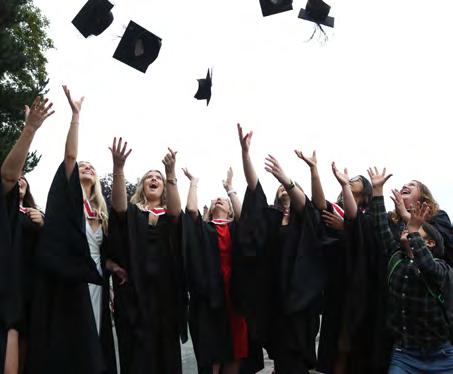
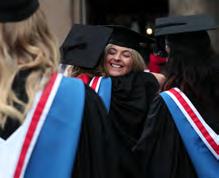
Vice-Chancellor of the University, Professor Eunice Simmons, presented the undergraduate and postgraduate degrees and awards at the graduation ceremony on September 22.
More than 100 graduands received awards after 180 enjoyed celebrations at St Chad’s, in the heart of Shrewsbury, in February - the first in-person ceremonies since before the pandemic.
Professor Simmons said: “Graduation ceremonies are a highlight of the academic year. Each is a testament to all the hard work
and dedication of our graduandsand a wonderful occasion for them all, their families, and everyone who has supported them in their achievements.”
Head of University Centre Shrewsbury (UCS), Professor Paul Johnson, said: “I am extremely proud of our students, our partnerships, and the contribution our students have made, and that our graduates will go on to make.”
Kimberley Jordan, who graduated with a degree in Medical Genetics and gave a speech at the ceremony, added: “I will always cherish the life-long friendships and memories I have made at UCS.
“The support I received from my friends, lecturers, the wider University, and of course my parents, has helped me tremendously in
achieving a first-class honours degree, and now furthering my studies with a Master’s degree.
“We have been provided with many opportunities at UCS to make friends and cement these friendships, to participate in events that would further develop our interpersonal skills, and help us carry these skills forward into our professional lives.
“We were only in our first year when COVID hit but we were given the help we needed which made the difficulties so much easier - and I would like to take this opportunity to say ‘thank you’ for all the support I have received.
“It has been an honour to celebrate with everyone, share a speech at our graduation ceremony and wish everyone all the best in their future endeavours.”
MORE than 2,700 soon-to-be-graduates were joined by their family and friends at Chester Cathedral this term to celebrate their achievements.
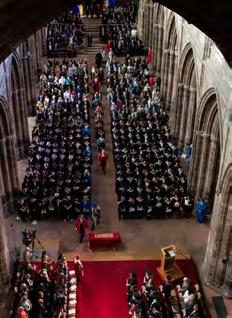
The University hosted its Chester graduation ceremonies across four days at the beginning of November.
They were joined by seven inspiring individuals who were recognised by the University for their achievements in their respective fields including sport, business, music and the arts.
Vice-Chancellor of the University, Professor Eunice Simmons, said: “We welcomed our latest graduates to celebrate their achievements in the majestic surroundings of Chester Cathedral. We congratulate them and will be supporting them as they embark on their careers.
“We were also very pleased to welcome distinguished individuals who have given so much to society and it gave us great pleasure to award them honorary degrees that recognise their significant achievements.”
The individuals were:
• Claire Harvey MBE who received an honorary Doctor of Letters (DLitt) in recognition of her outstanding contribution to sports, diversity and inclusion.
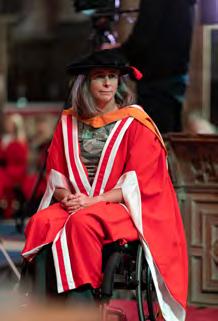
• Joëlle Warren MBE, DL who received an honorary Master of Business Administration (MBA) in recognition of her outstanding contribution to business.
• Professor Henry Sun who received an honorary Doctor
of Business Administration (DBA) in recognition of his outstanding contribution to business.
• Keith Skempton CBE, DL who received an honorary Master of Business Administration (MBA) in recognition of his outstanding contribution to the work of the Cheshire Military Museum.
• Lady Rose Cholmondeley who received an honorary Master of Music (MMus) in recognition of her outstanding contribution to the arts.
• Valérie Masterson who received an honorary Doctor of Music (DMus) in recognition of her outstanding contribution to the arts.
• Stephen McGann who received an honorary Doctor of Letters (DLitt) in recognition of his outstanding contribution to the arts.
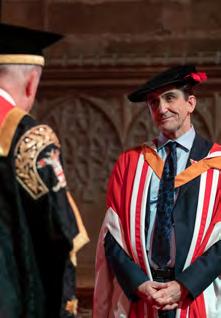
Stephen said: “As a child of Liverpool, I’m particularly proud and delighted to be awarded an Honorary Degree from the University of Chester. When I was a boy, Chester was a place I escaped to - full of the history that I loved. The Roman Museum - the beautiful and ancient Cathedral - somewhere where a bookish working-class child could dream and imagine places beyond himself.
“That’s where all good education begins; in travelling to new places that can challenge and spark passion. Chester was all of that, and it’s nice to come back and say thank you for what it has given to me.”
Stephen McGann.THE University’s Chapel was illuminated in purple as part of International Recovery Day celebrations and challenging the stigma associated with recovery from addictions.

For the third year in a row, the University’s Chapel was lit up in purple on the day (September 30) to show solidarity with staff and students in recovery from addictions and to indicate its ongoing commitment to addressing the stigma surrounding recovery and addictions.
Dr Wendy Dossett, Associate Professor of Religious Studies, whose award-winning research explores the role of spirituality in communities of addiction recovery explained: “People find it easier to seek support when the barriers of stigma are dismantled. Stigma can only be addressed if our social institutions, including universities, address it corporately. I’m proud that the University of Chester acknowledges and honours staff and students who are in, or seeking, recovery from addictions.
“Lighting our Chapel in purple on this significant day of celebration is part of that, but the University is doing so much more. We have a ‘Staff in Recovery’ group that meets weekly for confidential peer-support at the interface of recovery with workplace issues. This year, for the first time, we are offering Recovery Ally training to staff and students. This training will help us not only to develop the support people in recovery might need, but also to acknowledge and celebrate the strengths they bring to our University community.
“Furthermore, the University is a leading partner with other Higher Education Institutions in national discussions
towards a Pledge for the ‘Recovery Friendly University’.
Wendy added: “We recognise that the stigma associated with addiction is particularly ‘sticky’ and there is so much more to do. However, there is a groundswell of interest in challenging this stigma here at Chester, and indeed in the university sector more widely. We’re delighted that the University of Chester is in the vanguard of these national conversations.”
If you would like to get involved in the conversation about recovery within the University, please get in touch with Wendy by emailing: w.dossett@chester.ac.uk.
More information about International Recovery Day is available here.
The following organisations offer free support for addictions:
• Alcoholics Anonymous (for problems with alcohol)
• Narcotics Anonymous (for problems with all drugs)
• Gamblers Anonymous (for problems with gambling)
• NHS Addiction Support (to find local NHS support services)
• Smart Recovery (for alcohol and other drug issues)
• Al-Anon Family Groups (for family members and friends of people with substance issues)
• Westminster Drug Project (local substance misuse services in the Chester area)
• Warrington Drugs and Alcohol Support Service (local services in the Warrington area)
• Shropshire Recovery Partnership (local services in the Shrewsbury area)
If you would like to contribute to Forum, please contact Corporate Communications on extension 1344 or communications@chester.ac.uk
Editorial content by Corporate Communications. Designed by Graphics, LIS.
We are happy to provide the information in this document in alternative formats on request.